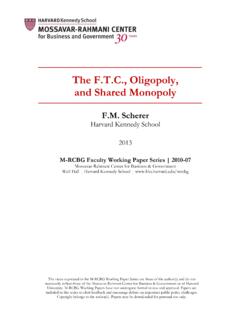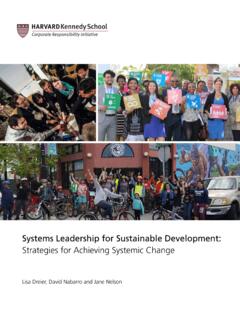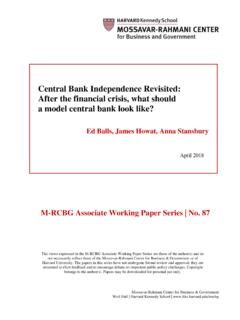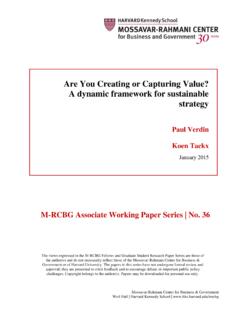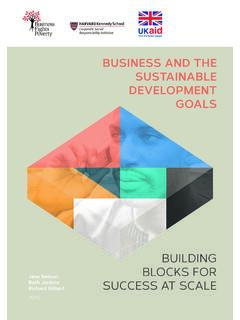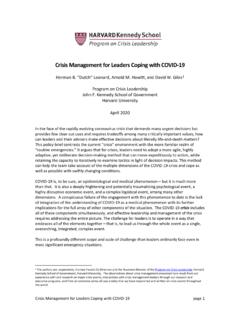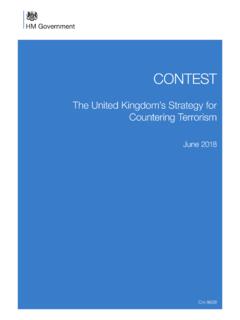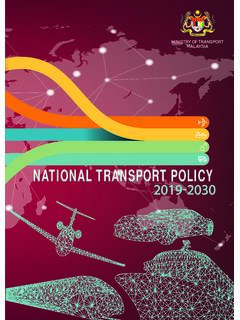Transcription of Essay Thursday, September 24, 2015 The Thucydides Trap
1 By Graham AllisonThursday, September 24, 2015 EssayThe Thucydides TrapWhen Barack Obama meets this week with Xi Jinping during the Chinese president s first state visit to America, one item probably won t be on their agenda: the possibility that the United States and China could find themselves at war in the next decade. In policy circles, this appears as unlikely as it would be unwise. And yet 100 years on, World War I offers a sobering reminder of man s ca-pacity for folly. When we say that war is inconceivable, is this a statement about what is possible in the world or only about what our limited minds can conceive?
2 In 1914, few could imagine slaughter on a scale that demanded a new category: world war. When war ended four years later, Europe lay in ruins: the kaiser gone, the Austro-Hungarian Empire dis-solved, the Russian tsar overthrown by the Bolsheviks, France bled for a genera-tion, and England shorn of its youth and treasure. A millennium in which Europe had been the political center of the world came to a crashing defining question about global order for this generation is whether China and the United States can escape Thucydides s Trap.
3 The Greek historian s metaphor reminds us of the attendant dangers when a rising power rivals a ruling power as Athens challenged Sparta in ancient Greece, or as Germany did Britain a century ago. Most such contests have ended badly, often for both nations, a team of mine at the Harvard Belfer Center for Science and International Affairs has concluded after analyzing the historical record. In 12 of 16 cases over the past 500 years, the result was war. When the par-ties avoided war, it required huge, painful adjustments in attitudes and actions on the part not just of the challenger but also the on the current trajectory, war between the United States and China in the decades ahead is not just possible, but much more likely than recognized at the moment.
4 Indeed, judging by the his-torical record, war is more likely than not. Moreover, current underestimations and misapprehensions of the hazards inherent in the relationship contribute greatly to those hazards. A risk associated with Thucydides s Trap is that business as usual not just an unexpected, extraordi-nary event can trigger large-scale con-flict. When a rising power is threatening to displace a ruling power, standard crises that would otherwise be contained, like the assassination of an archduke in 1914, can initiate a cascade of reactions that, in turn, produce outcomes none of the parties would otherwise have , however, is not inevitable.
5 Four of the 16 cases in our review did not end in bloodshed. Those successes, as well as the failures, offer pertinent lessons for today s world leaders. Escaping the Trap requires tremendous effort. As Xi Jinping himself said during a visit to Seattle on Tuesday, There is no such thing as the so-called Thucydides Trap in the world. But should major countries time and again make the mistakes of strategic miscalculation, they might create such traps for themselves. * * *More than 2,400 years ago, the Athenian historian Thucydides offered a powerful insight: It was the rise of Athens, and the fear that this inspired in Sparta, that made war inevitable.
6 Others identified an array of contributing causes of the Peloponnesian War. But Thucydides went to the heart of the matter, focusing on the inexorable, structural stress caused by a rapid shift in the balance of power between two rivals. Note that Thucydides identified two key drivers of this dynamic: the rising power s growing entitlement, Are the and China Headed for War? War between the and China is more likely than recognized at the moment. Indeed, judging by the historical record, war is more likely than not. The preeminent geostrategic challenge of this era is not violent Islamic extremists or a resurgent Russia.
7 It is the impact of China s ascendance. sense of its importance, and demand for greater say and sway, on the one hand, and the fear, insecurity, and determination to defend the status quo this engenders in the established power, on the the case about which he wrote in the fifth century , Athens had emerged over a half century as a steeple of civili-zation, yielding advances in philosophy, history, drama, architecture, democracy, and naval prowess. This shocked Sparta, which for a century had been the leading land power on the Peloponnese peninsula.
8 As Thucydides saw it, Athens s position was understandable. As its clout grew, so too did its self-confidence, its conscious-ness of past injustices, its sensitivity to instances of disrespect, and its insistence that previous arrangements be revised to reflect new realities of power. It was also natural, Thucydides explained, that Sparta interpreted the Athenian posture as un-reasonable, ungrateful, and threatening to the system it had established and within which Athens had chronicled objective changes in relative power, but he also fo-cused on perceptions of change among the leaders of Athens and Sparta and how this led each to strengthen alliances with other states in the hopes of counterbalanc-ing the other.
9 But entanglement runs both ways. (It was for this reason that George Washington famously cautioned America to beware of entangling alliances. ) When conflict broke out between the second-tier city-states of Corinth and Corcyra (now Corfu), Sparta felt it necessary to come to Corinth s defense, which left Athens little choice but to back its ally. The Peloponnesian War followed. When it ended 30 years later, Sparta was the nominal victor. But both states lay in ruin, leaving Greece vulnerable to the Persians.* * *Eight years before the outbreak of world war in Europe, Britain s King Edward VII asked his prime minister why the British government was becoming so unfriendly to his nephew Kaiser Wilhelm II s Germany, rather than keeping its eye on America, which he saw as the greater challenge.
10 The prime minister instructed the Foreign Office s chief Germany watch-er, Eyre Crowe, to write a memo answering the king s question. Crowe delivered his memorandum on New Year s Day, 1907. The document is a gem in the annals of logic of Crowe s analysis echoed Thucydides s insight. And his central ques-tion, as paraphrased by Henry Kissinger in On China, was the following: Did increasing hostility between Britain and Germany stem more from German capa-bilities or German conduct? Crowe put it a bit differently: Did Germany s pursuit of political hegemony and maritime ascendancy pose an existential threat to the independence of her neighbours and ultimately the existence of England?
